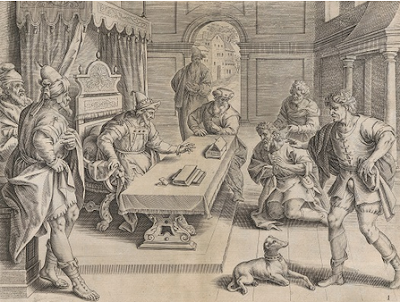The Twenty-fourth Sunday in Ordinary Time (A)
Dear brothers and sisters,
If one carefully observes our society, one might rightly be tempted to say the two words best describe our nation today: wrath and anger. Such an observation is not to say everyone is always marked by wrath and anger, but that the primary mindset of most people appears to be one of wrath and anger. A recent experience at the pharmacy confirmed this observation for me and that we are, in fact, a sinful nation.
Mistakenly thinking a prescription was ready (because I did not carefully read a text message), I went to the pharmacy to collect it and ended up waiting for it to be filled. I jokingly acknowledged my error, apologized, took a seat in the nearby chairs, and observed my fellow customers approach the counter and interact with the pharmacy staff. I was shocked and troubled at the level of rudeness exhibited on the part of the customers.
Of those who expressed wrath and anger toward the staff, only one or two had legitimate complaints, but the one to whom they yelled was not the one responsible. Even had the employee been at fault, there was no indication that these men and women were at all willing to “forgive [their] neighbor’s injustice” as the Lord commands us to do (Sirach 28:2). No feeling of mercy was to be found at all.
This did not seem to bother the customers. Not one other customer acknowledged a mistake on his or her own part – and there were several of these (one man did not bring his wallet and still expected to leave with his prescription without paying for it). Perhaps to their credit, the staff members took these verbal abuses in stride as a normal part of the job, yet their acceptance of this behavior is deeply distressing because it demonstrates where we are as a society; there is no mercy, only wrath and anger.
Such experiences are, regrettably, not limited to customers at a pharmacy; they are to be found in many different places, and not only on the part of customers. Wrath and anger have become part and parcel of our shared lives together as we have kicked mercy to the curb.
Let me be clear and direct, brothers and sisters: such behavior has no place in the hearts of men and women who profess faith in Jesus Christ and who claim to be Christians, his representatives in the world. We, as a society and as individuals, need to hear anew – and to take to heart – the words of Sirach: “Wrath and anger are hateful things, yet the sinner hugs them tight” (Sirach 27:30). The Lord Jesus does not call us to embrace our sin, but to turn away from it; he calls us to embrace the cross and to live lives of mercy.
It seems we have either forgotten or willfully ignore the strong command Christ Jesus has given us: “I give you a new commandment, love one another as I have loved you” (John 13:34). Jesus has not loved us by yelling at us. He has not loved us by blaming us for the mistakes or sins of others. He has not loved us with wrath and anger. Rather, he loved us by accepting the Cross and dying upon it for our salvation. He loved us by showing mercy. This is the love you and I must imitate at every moment of every day. Anything less than this is beneath our dignity as adopted sons and daughters of God.
Sirach counsels us to “remember your last days, set enmity aside; remember death and decay, and cease from sin” (Sirach 28:6). When we remember each of us will die and stand “before the judgment seat of Christ,” how can we fail to hear the strong words of Jesus, “Should you not have had pity on your fellow servant as I had pity on you” (II Corinthians 5:10; Matthew 18:33)? This is why Saint Paul tells us to “be kind to one another, compassionate, forgiving one another as God has forgiven you,” “as if to say: you must act according to the example of divine mercy, by reason of the passion of Christ, which leniently forgives” (Ephesians 4:32).[1]
If I continue to speak, I will simply begin to repeat myself, so let me now quote Saint Augustine:
My brothers and sisters, I urge you, I beseech you by the Lord and his gentleness, be gentle in your lives, be peaceful in your lives. Peacefully permit the authorities to do what pertains to them, of which they will have to render an account to God and to their supervisors. As often as you have to petition them, make your petitions in an honorable and quiet manner. Do not mix with those who do evil and rampage in a rough and disorderly manner; do not desire to be present at such goings-on even as spectators. But as far as you can, let each of you in his own house and his own neighborhood deal with the one with whom you have ties of kinship and charity, by warning, persuading, teaching, correcting; also by restraining him from such seriously evil activities by any kind of threats, so that God may eventually have mercy, and put an end to human evils…[2]
Let us turn away from sin. Let us reject wrath and anger and embrace mercy. May the Lord never have cause to say to us, “You wicked servant! I forgave you your entire debt because you begged me to. Should you not have had pity on your fellow servant as I had pity on you” (Matthew18:32-33)?


